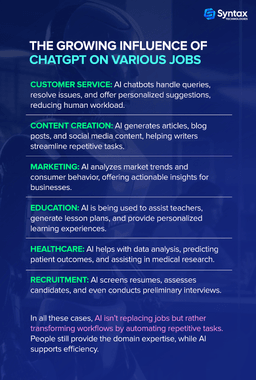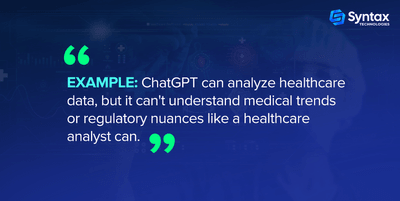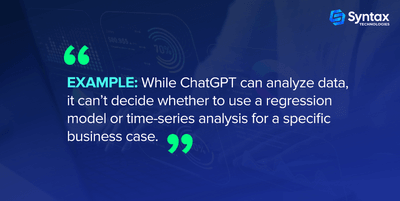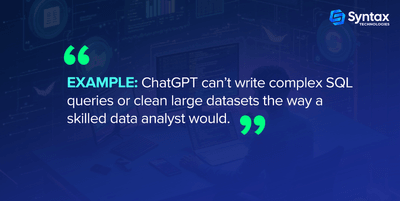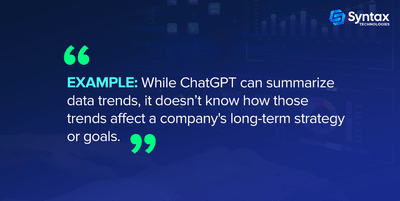As AI continues to advance, many professionals are starting to ask an important question: Will ChatGPT take data analysis jobs? With its ability to analyze large datasets, generate reports, and even provide insights, ChatGPT is already reshaping the way data analysts work. The real question is—will this AI tool eventually replace human analysts altogether?
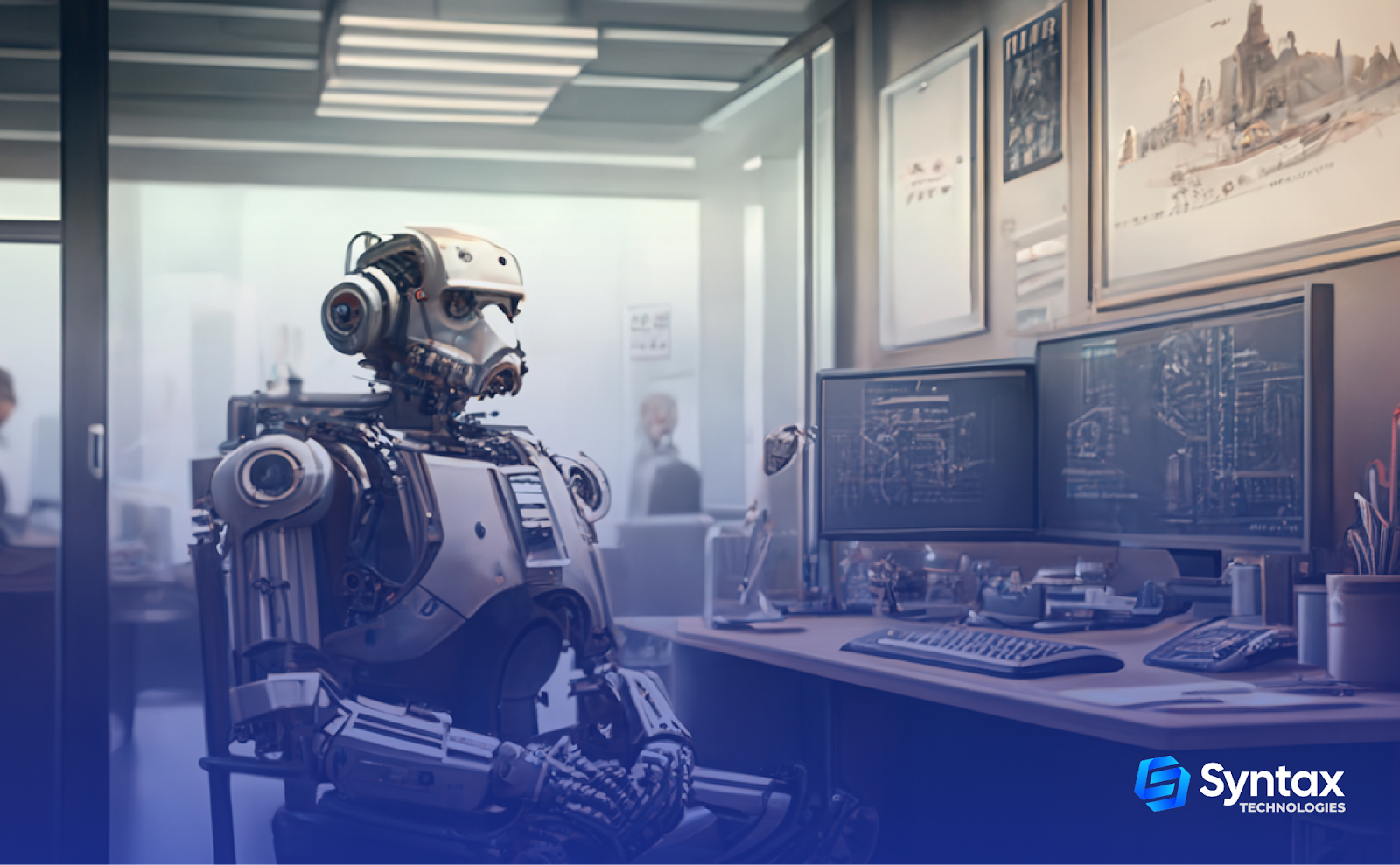
In this blog, we’ll explore the impact of ChatGPT on the field of data analysis, discussing the potential for job displacement, the limitations of AI, and why human expertise will still be essential. While ChatGPT can handle a lot of data-related tasks, it’s important to understand that it’s not a replacement, but a tool that works alongside data analysts, helping them to be more efficient and focused.
Understanding ChatGPT and Its Capabilities
Let’s break down what ChatGPT is. ChatGPT is a conversational AI developed by OpenAI that can generate human-like text based on the input it receives. It’s been trained on vast amounts of data and is capable of answering questions, explaining concepts, writing essays, and much more. In simple terms, ChatGPT can do a lot of things that we associate with human interaction, like writing or summarizing information.
But can ChatGPT handle the complexities of data analysis? Well, that depends on what aspects of data analysis we’re talking about. ChatGPT can automate certain tasks like generating reports, summarizing data, or explaining basic insights. However, the real question is whether it can fully replace data analysts who perform a wide range of tasks that go beyond just generating text.
Data Analysis Jobs: What Do They Involve?
To understand whether ChatGPT can take over data analysis jobs, let’s first break down what data analysts actually do. A data analyst is responsible for collecting, processing, and analyzing data to uncover valuable insights that can help a business make better decisions. Some key responsibilities include:
- Data Cleaning: This involves getting rid of inaccurate, incomplete, or irrelevant data. It’s often one of the most time-consuming tasks.
- Exploratory Data Analysis (EDA): This is when analysts look at the data to find patterns, trends, and outliers.
- Data Visualization: Analysts use tools like Power BI or Tableau to create charts and graphs that help decision-makers understand the data.
- Reporting: Finally, analysts create reports or dashboards that summarize their findings and present actionable insights.
These tasks require a deep understanding of the business problem, as well as the ability to interpret data in context. Can ChatGPT handle all of this?
How ChatGPT Could Impact Data Analysis Jobs
Will ChatGPT take data analysis jobs? Let’s look at the tasks where ChatGPT might have a noticeable impact.
1. Automating Repetitive Tasks
ChatGPT can easily help with repetitive tasks like:
- Generating Reports: Instead of writing reports from scratch, analysts can use ChatGPT to summarize data findings. It can also draft insights based on the data it’s provided, saving analysts a lot of time.
- Explaining Insights: ChatGPT can help analysts explain data insights in simple language, making it easier for non-technical stakeholders to understand complex analyses.
2. Data Cleaning
Although ChatGPT isn’t equipped to directly manipulate datasets (like cleaning missing or incorrect data), AI models can help in automating some parts of data preparation. AI tools can flag errors, suggest corrections, or identify inconsistencies in data that a human might miss.
3. Faster Data Exploration
ChatGPT can generate summaries or offer suggestions on possible analyses based on the data provided. It might even help analysts spot outliers or trends that they might have missed during their exploration phase.
4. Enhancing Data Interpretation
AI like ChatGPT can help with basic interpretations of data and offer suggestions. It can summarize data findings into easy-to-understand language, which is useful for presentations.
While ChatGPT can certainly speed up some processes, there’s more to data analysis than just automation.
Limitations of ChatGPT in Data Analysis
Despite the advantages, there are significant limitations to what ChatGPT can do in data analysis. Here are a few reasons why ChatGPT cannot replace data analysts entirely:
Lack of Domain Expertise
ChatGPT may be proficient at analyzing data, but it lacks the deep domain knowledge that human analysts bring to their work. Analysts, especially those in specialized fields like healthcare, rely on their understanding of industry-specific trends, regulations, and behaviors to interpret data in meaningful ways.
Complex Decision-Making
Data analysts are experts in understanding the nuances of data and making decisions based on that. ChatGPT can’t replace the human judgment required to choose which statistical techniques to use, or how to interpret ambiguous or conflicting data.
Hands-On Data Manipulation
While ChatGPT can help with data analysis in terms of providing basic summaries or explanations, it cannot interact directly with databases. ChatGPT isn’t going to write SQL queries or work with complex data manipulation tasks the way an experienced data analyst would. These hands-on tasks still require a human touch.
Contextual Interpretation
Many times, data insights need to be understood in the context of the business problem. ChatGPT might give a general interpretation of the data, but it can’t fully comprehend the broader business goals, strategies, or limitations. Analysts are better at adapting their interpretations to suit the company’s needs.
The Future of Data Analysts in the Age of AI
So, will ChatGPT take data analysis jobs? The answer isn’t straightforward.
While AI tools like ChatGPT can speed up tasks and enhance efficiency, they cannot replace human data analysts. Here’s why:
- AI Is Here to Assist, Not Replace: ChatGPT can automate repetitive tasks like summarizing data and generating reports, but it cannot make strategic decisions or provide deep insights. Human expertise is still essential for interpreting data in the context of business goals.
- Upskilling Is Key: Data analysts need to adapt and learn how to work alongside AI. Instead of fearing AI, they should embrace it as a tool that boosts their productivity.
Syntax Technologies’ Data Analytics course is helping analysts upskill by teaching them how to leverage AI tools, ensuring they remain relevant and focused on high-value tasks like advanced analytics and decision-making.
By upskilling, data analysts can use AI to enhance their work, staying essential in the evolving tech landscape.
Conclusion: The Balance Between Myth and Reality
So, will ChatGPT take data analysis jobs? While it can handle some aspects of the job, ChatGPT will never fully replace data analysts. The human expertise, business context, and decision-making ability that analysts bring to the table are essential for ensuring data-driven insights are valuable and accurate.
Instead of worrying about ChatGPT replacing your job, think about how you can use AI to augment your role. Data analysts will evolve and adapt, just as other professions have done when new technologies have emerged.

